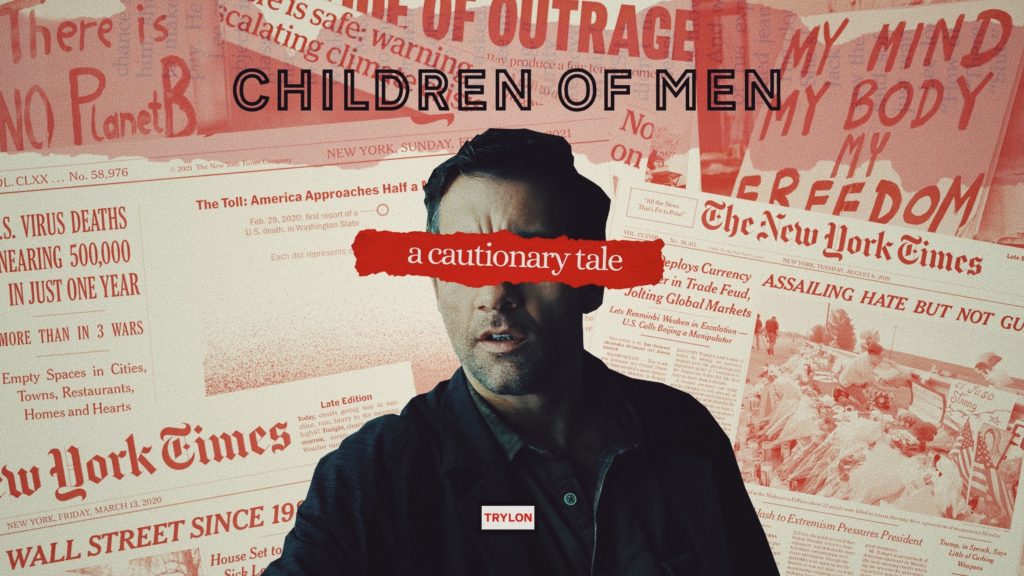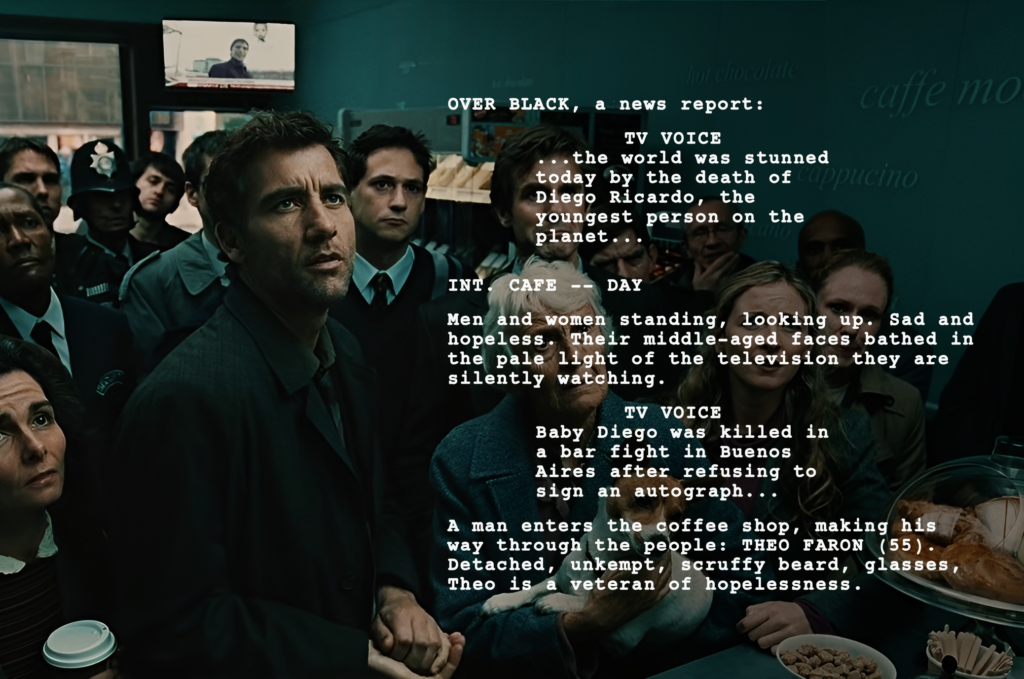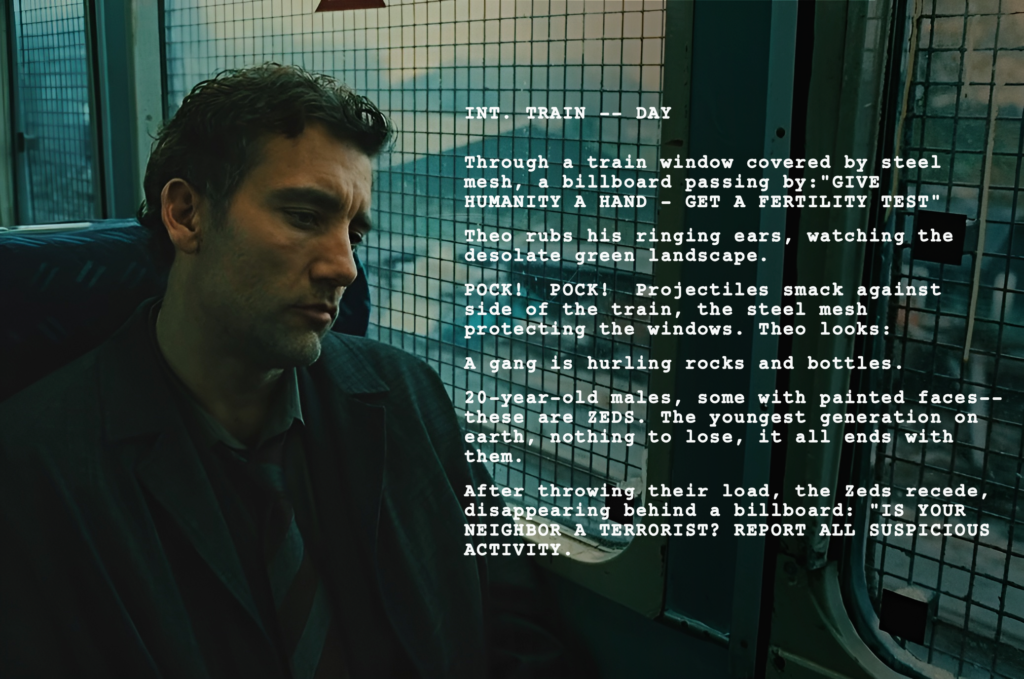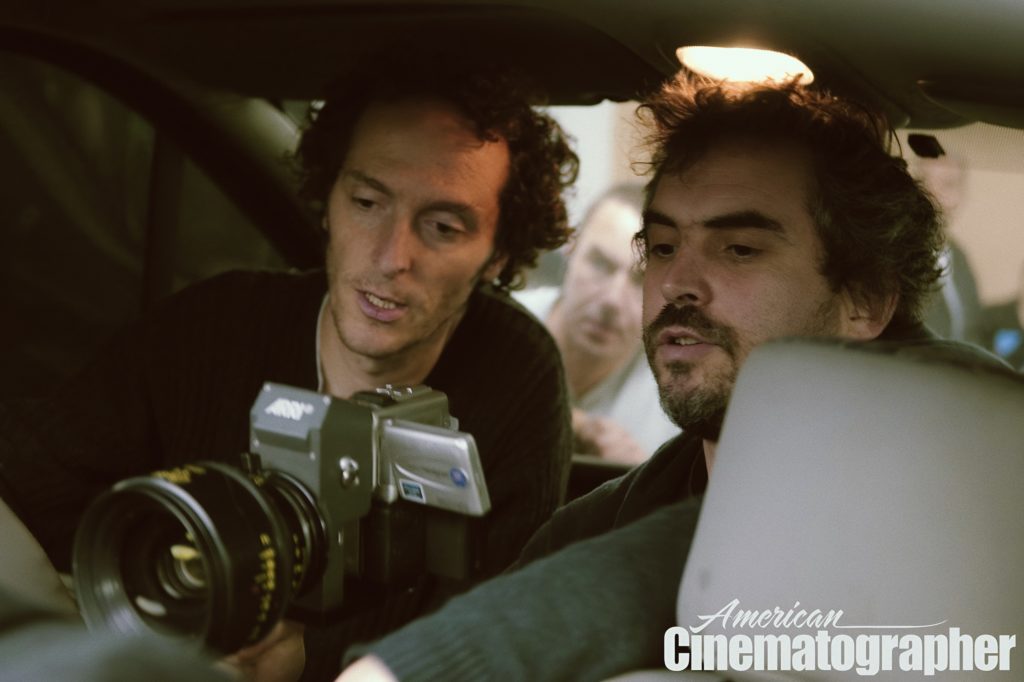| Justin Ayd |

Image credit: Justin Ayd
Children of Men plays at the Trylon Cinema from Sunday, January 8 through Tuesday, January 10. Visit trylon.org for tickets and more information.
In a grim, not-so-distant future in which the world’s population has suffered generations of infertility, a former activist—played by Clive Owen—reluctantly agrees to transport a miraculously pregnant woman to a sanctuary at sea.
Looking back on humanity’s long and broad history, man’s fetish with war, power, and greed is unquestionably a never-ending cycle. Through the lens of our collective experience following the three-year COVID-19 pandemic, paired with a post-9/11 landscape leading to an $8 trillion 20-year war that gave rise to unfettered xenophobia,1 as well as the catastrophic election of Donald Trump and all the connotations that elicits, Alfonso Cuarón’s film Children of Men is uncomfortably prophetic and far more urgent than when released in 2006.

Image credit: Justin Ayd
Clive Owen’s Theo is drifting through life in a state limbo. As a London-based civil servant with hefty ties to the world’s last remaining “functioning” government, he’s grown numb to those still affected by the perpetual collapse of humankind and is skeptical of those holding out hope for a better tomorrow. We can’t blame Theo for his disconnectedness. The acceleration of ecological decay, worldwide borders on lockdown, an eruption of refugees, expulsion of human beings, authoritarian police, religious extremism, mass civil unrest, overthrown political institutions, the unaffected rich, and, of course, a population in decline due to human infertility taken together are sufficient reasons for apathy.
This is 2027, a dystopian world put to paper and published in 1992 by English novelist P.D. James. It is worth noting the original novel—used as an extremely loose blueprint for Cuarón’s cinematic adaptation—is set in 2021, while the film’s screenplay is set in 2024. (The filmmakers ultimately shifted the setting from 2024 to 2027 during production.) Either way, both offer us a fictional reality that we’re more aquatinted with than would like to admit. In the film, the dawn of infertility arrived in 2009, the year following a global flu pandemic that claimed the life of Theo’s son Dylan, whom he had with Julian, his estranged wife and social activist (played by the consistently phenomenal Julianne Moore). This card no doubt draws us closer to home and directly into the hands of today’s rabid conspiracy theorists. None of us will be remotely surprised to learn about—or recall—the deep spread of misinformation concerning infertility and the coronavirus vaccines, with one institution claiming that “tens of thousands of women all over the world” were experiencing reproduction problems.2 Funny (but sad) how reality and science fiction have a tendency to converge.
Theo isn’t altogether rudderless. He finds bursts of solace from confidant Jasper Palmer, played by a relaxed and perceptive Michael Caine. Jasper—a pot-smoking/growing hippie leftist and former political cartoonist who lives in a secluded countryside cabin with his ill wife Janice—represents the intersection of Theo’s past, present, and potential future. He offers poetic wisdom in response to Theo’s pessimism. Is there value in saving humanity if its trajectory is that of extinction? When the youngest generation on earth—18-20-year-olds known as the Zeds—have lost all hope for a future free of death and destruction, it’s difficult to find the strength to say yes. It’s a familiar, universally-felt sentiment for us all; the moral obligation to do as much as we can even with odds stacked against us. And if we’re unable to find the will to rebuild a crumbling society, we sure as hell hope younger generations will have what it takes, however unfair the request may be. A common slang defined as “Zombies” in the United Kingdom, Zeds—much like post-9/11 Generation Z—grew up during a time of rapidly growing technology, extreme political division, and war. Zeds/Gen Z have taken on a responsibility created by their elders, yet Children of Men’s portrayal of Zeds is rather one-sided. This may be where a positive separation of science fiction and reality occurs. Often incorrectly viewed as apathetic, lazy, and entitled to older generations, Gen Z is shaping up to be the most progressive, inclusive, and empathetic generation in United States history. With the weight of the world on their shoulders, we’re in the early stages of witnessing an encouraging seismic shift at local, state, and national levels.

Image credit: Justin Ayd
In addition to societal similarities, Children of Men is ripe with spiritual symbolism, yet peeling back and analyzing the layers scene-by-scene would take away the sense of discovery for newcomers, however grim it may be. Those familiar with Cuarón’s work will note his disinterest in the expository nature of mainstream film. In a December 2006 interview, Cuarón states: “There’s a kind of cinema I detest, which is a cinema that is about exposition and explanations. It’s become a medium for lazy readers. Cinema is a hostage of narrative. And I’m very good at narrative as a hostage of cinema.”3 Children of Men offers a fair dose of exposition. However, the film sprinkles it around in a way that allows character insight and enough context to understand where we are without genuinely asking—and answering—why are we here?
Every film has its own set of challenges and requirements. For Children of Men, each department of the production delivered their finest work. From Cuarón’s sure-handed control and vision to the acting, sound, editing, special and visual effects, music, costume and production design, to cinematographer Emmanuel Lubezki’s documentary-inspired approach to his handheld photography, total collaboration was key in creating a film that is unquestionably remarkable. Lubezki’s tendencies as a cinematographer—the search for truth with imperfect framing, natural lighting and now-iconic uninterrupted takes—lead to a film that is melancholic, monochromatic, and unconventionally beautiful.

Emmanuel Lubezki and Alfonso Cuarón examine an angle with an Arri director’s finder fitted with a small video unit for recording and review.
Image credit: American Cinematographer, December 2006.
The fact that major aspects of Children of Men align with our present-day reality isn’t all that surprising, but still no less distressing. Like P.D. James and authors George Orwell, Jules Verne, and Ray Bradbury—all of whom have accurately predicted aspects of our present—cinema has produced a slew of deep cuts in its own right: Steven Soderbergh’s Contagion (2011), a gut-punch of an experience concerning the conflict between the working class, conspiracy theorists, government officials and the Center for Disease Control during an unprecedented global pandemic; John Carpenter’s They Live (1988), a science fiction film that’s more “documentary than science fiction” in its commentary on consumerism, propaganda, and corporate greed;4 Sidney Lumet’s Network (1976), a perfectly outrageous satire during its time focused on the exploitative dark side of American news television and how far corporate conglomerates will go for ratings; and, of course, Fritz Lang’s Metropolis (1927), the classic silent German film about an aggressively expanding utopia crumbling at the hands of corruption, corporate greed, income inequality, and class war in the ominous future of 2026.
For Children of Men, these themes occupy only the furthest corners of the frame. A scene early on highlights the distinct contrast between rich and poor when we see the elite enjoying the fruits of life, going about their day carefree, and actively turning a blind eye to the chaos that envelops the world. When Theo confronts a character about the purpose of preserving art when humankind’s time is running out, the character brazenly states, “I just don’t think about it.”
Certain clusters of politicians, political analysts, and commentators would have you believe that the poor are responsible for their own misfortunes; that laziness is a personal choice. This sentiment purposefully ignores structural and systemic polices that have oppressed marginalized groups of people for centuries. By rejecting the root of the cause, vanity prevails. Lecturing the arrogance out of those who willfully tune out the horrors of the world may be a lost cause, yet we still feel the need to try. Will they ever take a hard, introspective look at their destructive nature? If they do, will they even care?
In our present-day reality when citizens of the world are divided and pitted against each other; when racism, xenophobia, and antisemitism runs rampant; when Italy elects its most far-right fascist leader since Mussolini; when bodily autonomy has been stripped away from over 100 million people across the United States; when the Iranian government executes those who challenge their tyranny; when American leaders sympathize with white supremacy; and when an additional 45 billion dollars is mysteriously found to feed an already bloated U.S. military budget while we’re continually told universal healthcare is not an option, it’s easy to lose all hope, disconnect, and drift away.
Much like the totality of Children of Men, our present-day future—one that has been foretold by novelists, philosophers, and filmmakers—is admittedly bleak. But depending on your faith in the shape and trajectory of humanity as a whole, hope is either a light at the end of the tunnel or an unattainable dream. Maybe it’s naïve to speak this way, but I remain cautiously optimistic.
NOTES
1 Watson Institute – Cost of War – US Post 9/11 War Spending. https://watson.brown.edu/costsofwar/figures/2021/BudgetaryCosts
2 Miami Private School Won’t Employ Teachers Who Get the COVID-19 Vaccine – NBC News. https://www.nbcnews.com/news/us-news/miami-private-school-won-t-employ-teachers-who-get-covid-n1265462
3 Alfonso Cuarón, director of Y tu mamá también, searches for hope in Children of Men – Seattle Times – 2006. https://www.seattletimes.com/entertainment/alfonso-cuarn-director-of-y-tu-mam-tambin-searches-for-hope-in-children-of-men/
4 John Carpenter Looks Back on They Live. Yahoo! Entertainment. 2015.
https://www.yahoo.com/entertainment/john-carpenter-looks-back-on-they-live-its-174619686.html?soc_src=social-sh&soc_trk=ma
Edited by Olga Tchepikova-Treon
